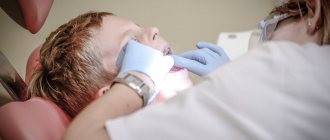Not every adult goes to the dentist with a smile and in high spirits. Fear of the dentist is common to many; this can be considered a legacy of the era when not the most effective anesthetics and loud drills were used for dental treatment, which terrified patients.
We raise children by example, so if a child is afraid of the dentist, even though he has never had his teeth treated, it means we did something wrong. Perhaps mom or dad avoids visiting the doctor or puts off visiting the office until the last minute, suffering from toothache. This is how we pass on our fears to inheritance.
And if the baby has already had a bad experience, then the fears are quite understandable - he avoids repeated pain. By the way, he may be afraid of the dentist even after an unsuccessful visit to a doctor of another profile - the so-called fear of white coats appears.
There are many more reasons for fear, and they are not always associated with the unconscious transmission of a negative attitude towards dentistry from parents or the child’s personal deplorable experience. Next, we will talk about the age characteristics of each period and the causes of anxiety.
Content:
- Where does the fear of going to the dentist come from?
- The main mistakes of parents
- How to overcome dental phobia
- Contact the professionals!
Parents who care about their child’s health know how important it is to take their child to the dentist in a timely manner. However, many of them face the problem of fear of visiting the dentist's office. What is the reason that a child is afraid to have his teeth treated? And what should you do when it’s time to make another visit to the dentist? Let's try to figure this out.
Where does the fear of going to the dentist come from?
There may be several explanations for the fact that a child is afraid to go to the dentist. For example:
- Meeting new people. A child's first visit to the doctor's office is just as stressful as the first day of kindergarten, for example. The child has to communicate with new people. Moreover, the interaction is quite close. And in this case, you can consult with a pediatrician on how to prepare your child for a visit to the dentist in order to take into account all the personal aspects of your child specifically.
- Fear of pain. For many, a visit to the dentist is associated with pain and blood, which is the main reason why even adults struggle with the decision to visit the dentist. It is important to explain to the child that now there are many modern treatment methods that make any procedure painless.
- Parents' conversations. You should not talk about your own dental treatment in negative terms in front of your child. After all, this can become another reason for children's fears.
- Psychological discomfort. It is important that the baby feels a positive attitude towards him from the attending physician. If the specialist does not inspire confidence, this will be one of the reasons that the child is afraid of visiting the dentist.
First visit
Above we have already partially touched on the importance of initial experience, now let’s talk about it in more detail. The child’s subsequent attitude towards the dentist and dental treatment in general depends on how the session goes.
What is important? No coercion. Don't try to force yourself to love the dental office. Usually such actions only cause negative reactions.
The most effective way is to lead by example. When you yourself are not afraid of dentistry and understand the importance of all the procedures performed, the baby will absorb your mood and will not worry.
In addition, so that the child is not afraid, it is good to go to the pediatric dentist. Those dentists who work with adults often lack the tact and sensitivity required at a young age.
Introductory visit
For convenience, we attach a detailed scenario of how the first visit should go:
- Acquaintance. The doctor cannot immediately begin with treatment or perform any complex manipulations. His task is to win over the patient.
- Gloves. Wearing them is not recommended, as is using intimidating tools and devices. The best option is to organize a short tour of the office with a story about what is needed and why.
- Dialogue. All actions must be accompanied by explanations. The unknown scares the baby.
- Leisure. In some clinics, cartoons are played or toys are provided for young patients. This is a good solution to shift your focus.
Please note that we are talking about a routine preventive examination.
The main mistakes of parents
Often parents themselves make mistakes that lead to the child not wanting to go to the dentist. Moreover, with age the situation may worsen. Among such errors are:
- Psychological pressure. In everyday life, parents, without thinking about their conversations and actions, can form a number of complexes and fears in their baby. For example, knowing that children are afraid of pulling teeth, they can remind them to visit the dentist every time the child asks for candy. This creates a fear in the subconscious of visiting the dentist’s office.
- Another problem with the formation of a psychological barrier before such visits can be intimidation of the baby if he disobeys and behaves badly at the doctor’s appointment. This way the child will form an association of the doctor with a sadist who is at one with the parents.
- Fear of pain. In this case, the child should be explained that the treatment uses drugs that reduce sensitivity. At the same time, if you do not go to the doctor, your teeth may hurt more.
- False promises. When deciding how to prepare a child for a trip to the dentist, some parents resort to the trick of promising that the doctor will not do anything at all, but will only conduct an examination. Or that after visiting the doctor you will go on an exciting trip. If the promises do not coincide with reality, then the child’s mistrust and fear will only increase.
- Excessive emphasis on the problem. There is no need to focus on the fact that at hour X you need to visit the dentist’s office. It is not recommended to remind you once again that there are problems with teeth growth or their condition. It's better to just make an appointment. After all, you don’t have preparatory conversations before going to the park or buying tickets to the circus.
- Lack of motivation. Explain to your child why to visit the dentist's office. This will instill responsibility for maintaining your own health and eliminate unnecessary fears.
Why do children become afraid of the dentist?
Kids experience fear of the dentist in different ways: some are afraid of the procedure itself, while others are afraid of the person who performs it. For example, young children may believe that the doctor is a bad person who can harm them, so he should be avoided in every possible way. Older children may be afraid of the upcoming anesthesia - they think that the needle will cause them terrible pain.
Also, the cause of fear is often unconscious associations that associate dental procedures with something unpleasant and creepy, and in some cases life-threatening. Therefore, in this case, you need to consider each situation separately.
Sometimes fear of visiting a dental clinic can be after a negative experience due to a previous visit. This often happens when adults are violent - to help hold the child during treatment. The baby will remember all this well, and next time he will not want to go into the office at all.
Parents, in the presence of their child, express doubts and worries before visiting the doctor. Children absorb absolutely everything – so their parents’ fears become their fears.
How to overcome dental phobia
If you don’t know what to do in a situation where a child is afraid of the dentist, then you should listen to a number of expert advice:
- Start visiting the dentist from the first year of life. Do not think that only molars require treatment. After all, the subsequent formation of molars depends on the correct development of baby teeth. It is important to monitor the condition of the oral cavity from the first days of birth. Therefore, you will need dental consultations from the cradle. And in the future, you won’t have to solve the problem of how not to be afraid of the dentist for children. After all, your baby will perceive the doctor as an assistant and adviser.
- Do not focus your child's attention on visiting the doctor. You should not once again remind your child that a visit to the doctor is scheduled for a specific date. It’s better to check it out during your next walk. The effect of surprise will allow the baby not to fully understand what is happening and not feel fear.
- Choose the right time for your visit. If you decide to come to the doctor early, waking up your baby earlier than usual. Or made an appointment during your lunch nap. If a visit to the doctor is planned instead of a trip to the zoo or entertainment center. If you had to postpone your long-awaited trip to the sea for a scheduled visit to the doctor. Be prepared that your child will develop a negative attitude towards such an event.
- Consider a reward system. Some parents, when looking for a solution to the situation of what to do if their child is afraid to have their teeth treated, resort to the option of placating their child with expensive purchases. However, this is not recommended, since on the one hand, a strong perception is formed that you can only get what you want by going to the doctor’s office. On the other hand, for a child such a visit is associated with additional stress. After all, he understands that parents will not just give money or gifts. This means that serious “tests” await him in the doctor’s office. It is better to suggest that after a visit to the dentist, take a walk to your favorite park, go on rides, and get some kind of souvenir in the doctor’s office. Such a visit should be associated with positive emotions and the exclusivity of the event.
- Set an example. It is important to remember that visiting the dentist for preventive purposes is recommended not only in childhood. Parents should also visit a doctor. And you can do this together with your son or daughter. Show that mom and dad also go for preventive examinations. This will relieve unnecessary fears and allow the baby to feel like an adult, which is very important at the stage of growth and development.
- Accompany your child. Do not leave your child alone in the doctor's office. This applies not only to situations where a tooth needs to be filled or pulled out. Be present during every appointment. This will allow the baby to feel supported and gain confidence.
- Turn your visit to the dentist into a game. You can take your favorite toys with you or buy a children's set of oral hygiene tools. Continue the game at home so that the child at the dentist’s appointment does not think about the treatment process, but perceives what is happening as part of the exciting activities.
- Tell stories. Buy books where the kind Aibolit helps the heroes cure their bad teeth, or the Tooth Fairy grants wishes and gives amazing miracles. Let your child become the hero of one of these fairy tales during a visit to the dentist.
- Find options to shift your attention. Ask the doctor to turn on an interesting cartoon, or tell a fairy tale or funny story yourself while the baby is in the dentist’s chair.
- Visit one doctor. Let your child get used to the doctor. After all, by trusting a child will be able to cope with fear faster.
- Talk to your child. Explain to your child why to visit the dentist. Tell us that if you regularly check the condition of your oral cavity, you can avoid caries and the need to remove a tooth. Motivate your child for preventive examinations that will maintain oral health.
- Schedule an orientation visit. There is no need to wait until your teeth hurt or your bite needs correction. It is better to include a visit to the dentist in the plan of important events without any special reason. In this case, the child’s first visit to the dentist will not leave associations with pain and other unpleasant manipulations in his psyche. After all, it will just be an inspection. And subsequent visits will form a clear understanding that visiting the dentist is a habitual activity that is not associated with painful sensations.
- Build independence. Encourage your child to manage his or her own schedule for visiting the doctor's office. Explain why this needs to be done every six months. This way, the baby will be able to feel like an adult who has been entrusted with the responsibility for monitoring his health.
- Don't cause problems. For parents, this advice should be basic. After all, it is not at all necessary to wait until the child begins to complain of toothache or the problem arises of the need for professional teeth cleaning, bite correction, milk tooth removal, or gum treatment. It is better to prevent problems and eliminate them at an early stage. And then you won’t have to think about the question of why children are afraid of the dentist. After all, a visit to the doctor will become as common as visiting a kindergarten, a visit to a hairdresser or a tutor.
And, of course, look for your dentist. After all, if a child is afraid to pull out a tooth, then this is quite natural and justified. Not every adult is ready to undergo such a procedure without fear. But in the case when a child becomes nervous, irritable, and capricious before each visit to the dentist, then you should think about the qualifications of the specialist you are visiting.
Modern means
What to do if a child does not allow his teeth to be treated due to fear of pain? If he has already experienced discomfort in the dental chair, the task becomes more complicated. There is no magic pill for fear, but there are many modern methods that will help make the treatment process painless and comfortable. We are talking about sedation.
This method is suitable only for those children who are able to sit in the dentist’s chair, albeit with excitement. Sedation involves inhaling nitrous oxide and is used in children over three years of age. This method helps you relax, relieve anxiety and be able to calmly carry out all therapeutic procedures. At the same time, the child is conscious, sedation only relieves emotional stress.
For children under three years of age, as well as those who categorically refuse to even open their mouth in the presence of a person in a white coat, anesthesia is suitable. Treatment in a dream is a more complex event that requires thorough preparation. It is important to undergo a preliminary examination and also consult with an anesthesiologist. Modern medications allow you to put your baby to sleep without fear for his health.
Contact the professionals!
The Dr. Keller clinic employs pediatric dentists who can find an approach to your child. They will provide comfortable reception conditions, tell the baby how important it is to take care of oral hygiene, and will be able to become the child’s true friends who can be trusted. They will prove that you can treat teeth without fear and pain. After all, their task is a healthy smile for every child who comes to the dental office. Dr. Keller makes dental treatment fun. And you need to tell your baby about this. So, if you haven't visited the dentist's office yet, now is the time to make an appointment!
What if dental phobia cannot be eliminated?
If the patient experiences severe fear that cannot be eliminated, sedation is the best option. This is the name of the procedure that allows you to put the patient into sleep, during which he will not experience any discomfort, but will wake up with healthy teeth. This approach is becoming increasingly popular, especially in pediatric dentistry. It is important to understand that the situation has improved greatly over the past decade. Natadent dentistry has a wide range of local and general anesthesia products. Almost any manipulation in the oral cavity involves pain relief, so the days of painful dental treatment are a thing of the past. The best way to understand this and overcome dental phobia forever is to visit the dentist more often in order to promptly identify and eliminate any dental problems in the initial stages.
Literature
- Boyko V.V. Recognizing and overcoming fear at a dental appointment // Institute of Dentistry, 2002. – No. 1, 4. – P. 15-23.
- Vinogradova T.F., Snagina N.T. Guide to pediatric dentistry // Medicine, 1995. – pp. 75-83.
- Gashimov R.G., Arakelova M.N. Psychological characteristics of children with dental diseases // Dentistry, 1988. – pp. 58-60.
- Ivanov G.G., Ivanova M.A. Assessment of the psycho-emotional state of children // Childhood Dentistry and Prevention, 2001. – No. 1. – P. 23-26.
- Lepelin A.V., Sutenkov D.Ya., Kazakova L.N. Psycho-emotional stress as the basis of dental phobia and the cause of the development of fear // Pediatric dentistry and prevention, 2004. - No. 3. – P.18-25










